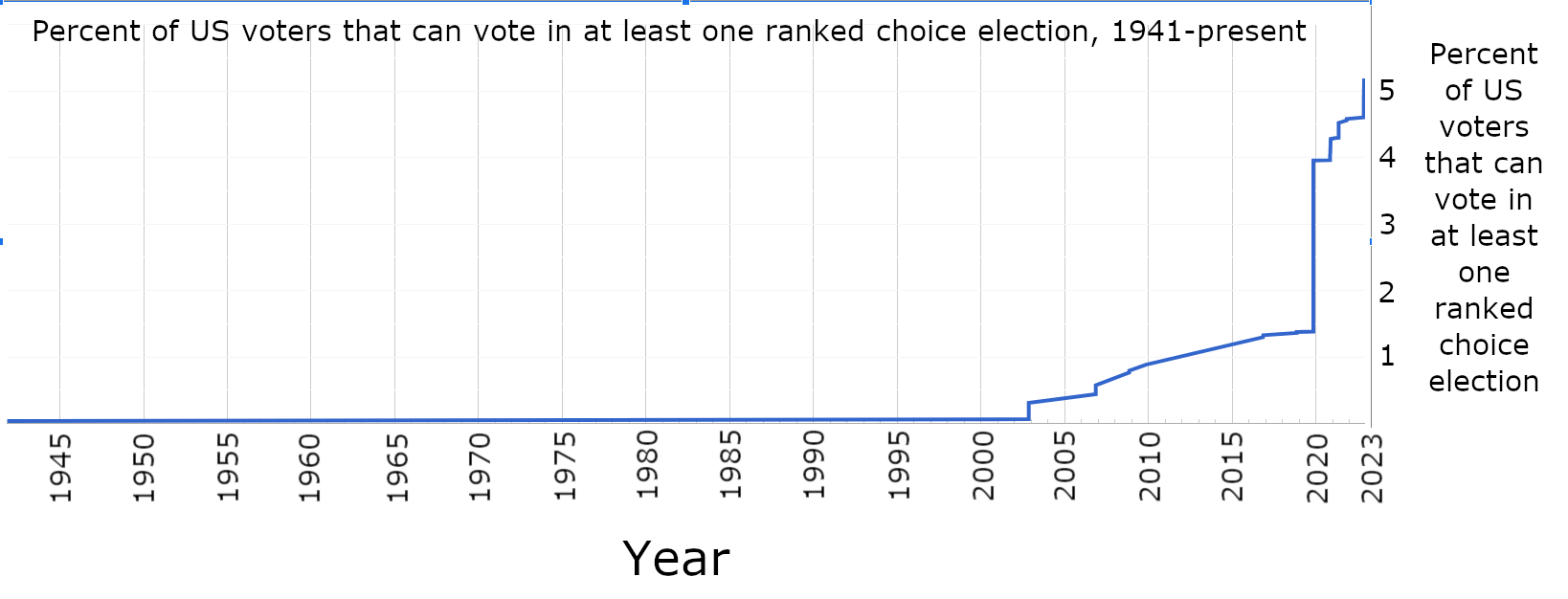Comments
thetreecycle OP t1_j8q9bgx wrote
Some more detail if you're interested.
It goes back to 1941 because that's the first city I could find that implemented ranked choice voting in the US that has kept it till present: Cambridge Massachusetts. The big jump a bit before 2020 was when New York City adopted Ranked Choice voting.
I'd like to add some detail to show which states it was implemented in but couldn't figure it out in the time I had.
I apologize that it's a bit ugly, the Google Sheets timeline chart is not very customizeable and my Gimp skills are only OK. However, I have heard that Ranked Choice is growing in popularity as a voting method in the US so I wanted to see the trend for myself but couldn't find anything graphing this trend, so I made it.
77Gumption77 t1_j8qqsr3 wrote
Ranked choice voting is so bad for so many reasons. It's complicated, encourages back room deals between "opposing" candidates that aren't disclosed to voters, is hard to tabulate and is unpredictable, encourages gamesmanship by voting blocks, and enables more fringe candidates to win elections. It's so easy to corrupt it. This is a bad trend.
thetreecycle OP t1_j8qugeg wrote
>It's complicated
It takes a few minutes to explain to people, but ranked choice voting solves the demonstrated problem of the spoiler effect. This justifies the ever so slight increase in complexity. If the average American voter cannot rank their favorite three things from most favorite to least favorite, democracy is in trouble.
For example, if someone had preferred Ross Perot back in the day but would have chosen George H.W. Bush over Bill Clinton, then Bush would have won, not Clinton, which reflected the majority of the people's will back then.
>encourages back room deals between "opposing" candidates
I'm not sure what you mean by this. Please explain how you think ranked choice voting incentivises collusion.
>hard to tabulate
I could write a program to implement the basics of ranked choice voting, instant runoff voting in a day of work. Over 99% of ballots today are counted electronically so don't worry about hand counted ballots. Also, ranked choice voting can save money in the voting process by avoiding the need for runoff elections.
>encourages gamesmanship by voting blocks
Again not sure what you mean or why this would be encouraged by ranked choice voting more than first-past-the-post.
>enables more fringe candidates to win elections
On the contrary, ranked choice voting incentivizes politicians to have more mainstream policies. Getting people's first vote would be the ideal for a candidate, but if they can get the voters' second or third votes where other candidates cannot, that can win the election for the candidate. So the candidate is incentivized to find common ground with voters who wouldn't have voted for them otherwise.
>easy to corrupt it
I don't see how, please explain.
The only organized opposition to ranked choice voting that I have seen is by politicians who have only gotten into power because people held their nose and voted for them. Ranked choice voting is a threat to their power and their careers because it forces political candidates to reflect the will of the people.
PredictorX1 t1_j8r9ckb wrote
It would be interesting to contrast this with the proportion of votes cast in ranked choice elections.
Chronotaru t1_j8rfarx wrote
Ranked choice combined with proportional representation is the difference between a genuine democracy and a fake one run by two intransigent ruling cliques.
[deleted] t1_j8rgf25 wrote
[removed]
Boatster_McBoat t1_j8ruewk wrote
That's progress. Coming from Australia ranked choice (or preferential as we call it) is the only system I have used. My jaw dropped when I learned the methods in place elsewhere.
Boatster_McBoat t1_j8ruiw9 wrote
You could also make voting compulsory. Just sayin' :-)
thetreecycle OP t1_j8sfgfz wrote
How do you think ranked choice has affected politics where you are?
thetreecycle OP t1_j8sfti6 wrote
I mean in first-past-the-post politicians must be at least loosely tied to the will of the people, otherwise they will get voted out, but yes ranked choice seems to much more accurately pick candidates that reflect what people want.
thetreecycle OP t1_j8sgook wrote
Depending on who you ask, ranked choice voting either increases or keeps voter turnout the same.
Edit: Again why the downvote? I’m just quoting data.
Chronotaru t1_j8sj13z wrote
Not really though. Let's look at every time where the Democrats or Republicans become more popular, you then end up with a breakaway candidate who could help explore that difference better, but instead that very process means the less popular ideological faction wins because the most popular became too popular to stand behind one candidate. It happened with Nader, it happened with Perot.
thetreecycle OP t1_j8szjmz wrote
I think we’re saying the same thing, I agree with everything you said above.
Boatster_McBoat t1_j8tv0j8 wrote
We have more minor party representation, particularly in the senate where each state appoints 12 senators (6 every three years). Occasionally it requires one of the major parties to do a deal to form government - this often tempers the more extreme elements of the relevant major party. Overall I think our parliament is more diverse and representative of our population than it would be otherwise.
thetreecycle OP t1_j8tz4mz wrote
That is wonderful to hear, can’t want for ranked choice to spread in the US, tons of states have proposed legislation in support of ranked choice.

[deleted] t1_j8q882l wrote
[removed]